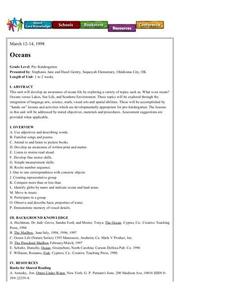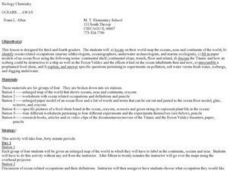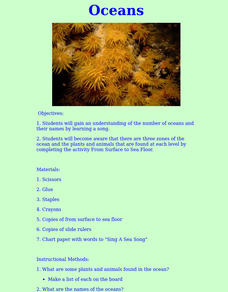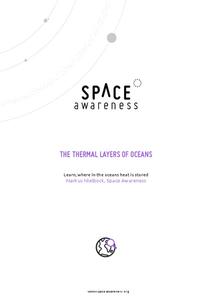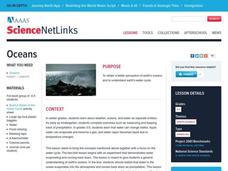Space Awareness
Oceans as a Heat Reservoir
Oceans absorb half of the carbon dioxide and 80 percent of the greenhouse gases released into the atmosphere. Scholars learn how and why the oceans store heat more effectively than land and how they help mitigate global warming. Pupils...
Space Awareness
Oceans on the Rise
Temperature rises and land disappears! Through a lab exploration, learners understand the effect of temperature increase on water similar to the effect of global warming on our oceans. As they heat the water in a flask, they measure the...
NOAA
Oceans of Energy
Are the earth's oceans really just giant batteries, waiting for their energy to be harnessed? Middle school mechanical engineers will be shocked by the amazing amount of energy that forms around them after diving into part four of a...
Curated OER
Introduction to Oceans
Students complete a variety of activities in preparation for a unit on oceans. They discuss their own proximity to the ocean, identify and name the oceans on a globe, and in small groups identify facts about a selected ocean. Students...
Curated OER
Oceans
Students become aware of the differences between ocean water and lake water by smelling, tasting and seeing. They distinguish between land and bodies of water on a globe and gain increased awareness of oceans and life.
Curated OER
Oceans Away
Young scholars explore oceans. In this science lesson plan, students locate oceans, seas and continents of the world, identify ocean-related occupations, and complete activities pertaining to food chains as well as pollution.
Curated OER
Oceans
Students gain an understanding of the number of oceans and their names by learning a song. They become aware that there are three zones of the ocean and explore the plants and animals that are found at each level.
Curated OER
Marine Life, Oceans, Lakes and Rivers
Students examine the types of organisms found in oceans. In groups, they read articles about the research done at certain sites. They work together to research their own water ecosystems and report the findings to the class. To end...
Curated OER
Shapes and Patterns in Art and Oceans
First graders draw, cut out, and design their own fish shapes by cutting out shapes and putting them together. In this shapes and patterns worksheet, 1st graders also construct a stamp and print patterns with stamps to repeat a...
Space Awareness
The Thermal Layers of Oceans
How much does the sun heat up a lake or ocean? Scholars use a cup and a strong lamp to investigate the heat transfer and thermal layers in the ocean to come up with the answer. They collect data and graph it in order to better understand...
Google
Adventure on the High Seas
Ahoy there! A fun computer science lesson challenges pupils to write a program that creates an ocean wave. They then develop stories to accompany their projects. All of this takes place within the Scratch coding program.
Curated OER
Book: Crossing the Seas
As learners read each chapter of Eric Schwartz's Crossing the Seas, they analyze the actions of United States in Venezuela, Hawaii, Cuba, the Philippines, Puerto Rico, and the intent of the Monroe Doctrine. They then compare...
Curated OER
Underwater Mountains & Trenches
Students determine Earth's deepest trench, outline continents, major ocean mountains, and trenches on color-key map using Crayola Erasable Colored Pencils, identify oceans' geographic features, locate significant oceanic features around...
Curated OER
The Continents and Oceans of the World
Students explore world mapping skills. In this world geography lesson, students identify and label the continents and oceans on a world map using the Visual Thesaurus. Students generate mnemonic devices to help memorize these terms.
Curated OER
Oceans
Students use their prior knowledge to being their examination of the water cycle. In groups, they complete an experiment in which they can see water evaporating and coming back to the ground. They discover the ocean's water evaporates...
Curated OER
Oceans
First graders examine how the earth is covered with more water than land. They toss an inflatable globe around the classroom, and each time a student catches the ball with two fingers, they tally whether the fingers land on water or...
Curated OER
Understanding Oceans
Students investigate how ocean currents affect our world. In this ocean currents lesson, students perform an experiment to show how cold water is near the poles and warm water is near the equator. Students use water, food coloring,...
Curated OER
Blue Planet: Tidal Seas
Students investigate how tides affect sea life. In this video based lesson, students view a video on how tides affect sea life. They do web-based research to find the answers to a series of questions and then play Tidal Trivia to test...
Curated OER
Blue Planet: Seas of Life - Tidal Seas
After viewing the video Blue Planet: Seas of Life, students review oceanic concepts. In this earth science lesson, students reflect on the effect tides have on living things and conduct research to create a "tidal trivia" game....
Curated OER
Oceans: A Sensory Haiku
Young scholars create an ocean haiku. In this haiku lesson plan, students use their five senses to write a haiku. Young scholars watch videos about the ocean, make a sensory portrait, and create a class haiku.
Space Awareness
Ocean Acidification
Learn the science behind ocean acidification and its effects on ocean wildlife. Young scientists conduct a laboratory investigation that monitors the acidity level of water. While burning a candle, learners capture the carbon dioxide in...
Curated OER
Oceans of the World
Students compare and contrast information about oceans. They locate the oceans on a globe, and in small groups conduct Internet research on the oceans, identifying the similarities and differences and writing a report.
Curated OER
Continents and Oceans
Students identify oceans and continents and their locations on a map. They color-code and label their own map of the world's continents and oceans. They play the game Continents and Oceans to identify specific areas.
Curated OER
What Do You Know About Oceans?
Learners brainstorm and discuss what they know about oceans and seas, read poem My Ocean Speaks by Olga Cossi, discuss narrator's feelings about ocean, write reflective journal entries about their experience or inexperience with the...
Other popular searches
- Identify Oceans and Seas
- Oceans and Seas Maps
- Oceans and Seas Preschool
- Balm Oceans and Seas
- Oceans and Seas Worksheet
- Blm Oceans and Seas
- Major Cities/oceans/seas




